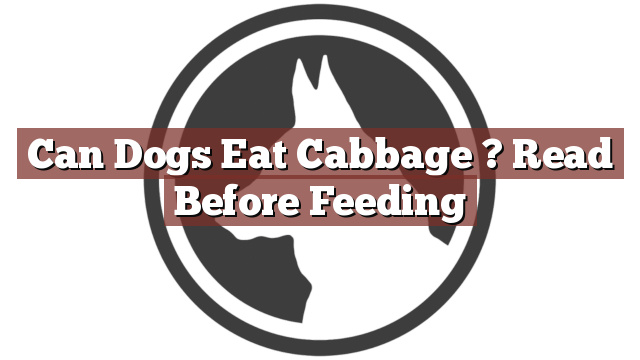Understanding Your Dog’s Dietary Needs
Before considering what foods you can offer to your furry friend, it is crucial to understand your dog’s dietary needs. Dogs are omnivores, meaning they can consume both meat and plant-based foods. However, their nutritional requirements differ from those of humans. While some human foods are safe for dogs to consume, others can be harmful and even toxic to them. Therefore, it is essential to research and ensure that any food you plan to feed your dog is safe and beneficial for their health.
Can Dogs Eat Cabbage? Read Before Feeding
Can dogs eat cabbage? This is a common question among dog owners who seek to diversify their pet’s diet. The answer is yes, dogs can eat cabbage, as it is generally safe for them when given in moderation. Cabbage is a nutritious vegetable that contains several beneficial components. Packed with essential vitamins such as vitamin C and K, as well as fiber, cabbage can contribute to your dog’s overall health. However, it is crucial to note that while cabbage is generally safe, some dogs may experience digestive issues or gas if they consume it excessively.
Pros and Cons of Feeding Cabbage to Dogs
Feeding cabbage to your dog can offer several advantages. Firstly, cabbage is low in calories and fat, making it an ideal choice for dogs who need to maintain a healthy weight or are on a weight-loss diet. Additionally, cabbage contains high levels of fiber, which can aid in digestion and promote bowel regularity. The vitamins and minerals found in cabbage, such as vitamin C and K, can also support your dog’s immune system and contribute to their overall well-being.
However, as with any food, there are a few cons to consider when feeding cabbage to your dog. Some dogs may be more sensitive to the cruciferous nature of cabbage, which can lead to gastrointestinal distress, such as bloating or excessive gas. It is important to introduce cabbage gradually into your dog’s diet and monitor their reaction to ensure they tolerate it well. If you notice any adverse effects, it is best to consult with your veterinarian.
Conclusion: Considerations for Feeding Cabbage to Your Dog
In conclusion, dogs can eat cabbage as long as it is given in moderation and properly prepared. Cabbage can provide your furry friend with essential vitamins, minerals, and fiber, contributing to their overall health. However, it is crucial to introduce cabbage slowly and monitor your dog’s reaction. If they experience any digestive issues, it is best to limit or avoid feeding cabbage to them. As always, it is recommended to consult with your veterinarian before making any significant changes to your dog’s diet or introducing new foods to ensure their safety and well-being.
Thank you for taking the time to read through our exploration of [page_title]. As every dog lover knows, our furry friends have unique dietary needs and responses, often varying from one canine to another. This is why it's paramount to approach any changes in their diet with caution and knowledge.
Before introducing any new treats or making alterations to your dog's diet based on our insights, it's crucial to consult with a veterinarian about [page_title]. Their expertise ensures that the choices you make are well-suited to your particular pet's health and well-being.
Even seemingly harmless foods can sometimes lead to allergic reactions or digestive issues, which is why monitoring your dog after introducing any new food item is essential.
The content provided here on [page_title] is crafted with care, thorough research, and a genuine love for dogs. Nevertheless, it serves as a general guideline and should not be considered a substitute for professional veterinary advice.
Always prioritize the expert insights of your veterinarian, and remember that the health and happiness of your furry companion come first.
May your journey with your pet continue to be filled with joy, love, and safe culinary adventures. Happy reading, and even happier snacking for your canine friend!

